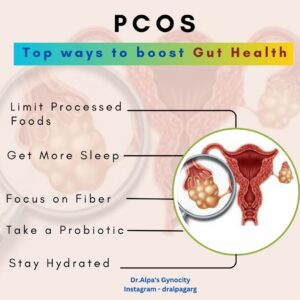Did you know that the food you eat can significantly impact your experience of Polycystic Ovary Syndrome (PCOS)? Absolutely! Recent findings reveal that the gut microbiome of women with PCOS differs from those without the condition. By making strategic changes to enhance your gut microbiome, you have the potential to positively impact your PCOS symptoms, benefiting both your physical well-being and emotional state.
The Beneficial Balance of Gut Bacteria:
Within our gut, an intricate balance between beneficial and harmful bacteria plays a pivotal role in shaping our overall health. These microorganisms collectively form what is known as the gut microbiome. The beneficial bacteria, often referred to as “good bacteria,” are not just passive inhabitants of our digestive tract; they actively contribute to maintaining the body’s optimal functionality while also help against a range of potential health issues. These form a harmonious relationship with our body, carrying out vital functions that influence various aspects of our well-being.
In contrast, there are harmful bacteria too that can disrupt this delicate equilibrium, potentially leading to a cascade of health issues and might promote inflammation, impair digestion, and interfere with the intricate signalling systems that govern various physiological processes.
The state of our gut health is heavily influenced by our environment and lifestyle choices. Factors such as pollution, smoking, exposure to toxins, antibiotic use, and endocrine-disrupting chemicals can increase the destructive bacteria. Additionally, inadequate sleep and stress levels can decimate the population of beneficial bacteria. Remarkably, what we eat significantly influences the well-being of our gut microbiome.
Diets rich in processed foods and excessive sugar can contribute to compromised gut health. Leaky gut syndrome, a condition where the integrity of the digestive tract lining is compromised, emerges when the balance between harmful and beneficial bacteria tilts unfavourably.
This imbalance, with an excess of detrimental bacteria and a lack of of beneficial ones, can cause the intestinal lining to become permeable. Consequently, this may allow harmful substances like toxins and endocrine-disrupting compounds to leak into the digestive system, triggering inflammation and damage. These consequences can worsen insulin resistance and amplify the symptoms of PCOS.
Remarkably, the human gut operates independently of the brain, housing its own intricate system that performs a multitude of crucial functions. Disrupting these functions can have profound implications for overall health.
Key Functions of the Gut:
- Synthesizing vital vitamins like biotin, folate, and vitamin K, along with essential amino acids.
- Producing significant metabolic by-products from dietary components that escape digestion in the small intestine.
- Enhancing and preserving immune function.
- Regulating appetite through hormones such as leptin and ghrelin.
- Influencing serotonin levels, which play a role in mood and well-being.
- Detoxifying drugs and environmental metabolites.
Maintaining a healthy gut microbiome emerges as a pivotal aspect of PCOS health. The encouraging news is that even small dietary adjustments can lead to improved gut function in as little as 24 hours. Here are five simple steps to consider:
- Embrace Plant-Based Proteins: Studies show that individuals consuming animal-based proteins from meats, eggs, and cheeses exhibited higher levels of harmful bacteria and lower levels of beneficial bacteria. In contrast, those opting for plant-based proteins like pea protein or soy—a complete protein—nurtured the growth of beneficial bacteria.
- Prioritize Fiber Intake: Fiber isn’t digested by the body but instead traverses the digestive tract, carrying cholesterol and harmful bacteria for elimination. The fermentation of fiber into short-chain fatty acids promotes the growth of beneficial microbes while reducing inflammation. By incorporating more fiber into your diet, you’re essentially fostering the proliferation of health-supporting gut microbes.
- Harness the Power of Prebiotics: Prebiotics, found naturally in foods like soybeans, legumes, vegetables (such as onions, garlic, shallots), unrefined wheat, barley, raw oats, and fruits (like berries and apples), serve as nourishment for beneficial gut bacteria. These substances are fermented in the intestines to cultivate a thriving community of health-promoting bacteria.
- Embrace Resistant Starches: Resistant starches act as fuel for probiotics, enhancing the overall microbiome. Cold potatoes, cooked starchy vegetables, unripe fruits, and certain cereals are excellent sources of resistant starches.
- Aim for Adequate Fiber Intake: Strive to consume 25 to 35 grams of fiber daily to support optimal gut functioning. Incorporating a diverse array of high-fiber foods—resembling a colourful rainbow—can effectively optimize your gut microbiome. Opt for organic foods to minimize exposure to toxins that might compromise your microbiome.

By adopting these dietary strategies and cultivating a mindful approach to your eating habits, you can actively participate in nurturing your gut microbiome.
Since everyone’s body is unique, consider consulting a registered dietitian or healthcare professional experienced in PCOS and gut health to tailor your approach and achieve the best possible outcomes. Your journey toward enhancing your gut health can significantly contribute to the management of PCOS symptoms and your overall well-being.
